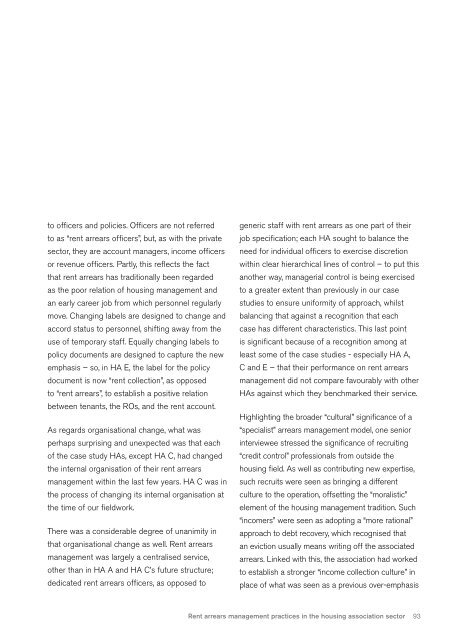Rent arrears management practices in the housing association sector
Rent arrears management practices in the housing association sector
Rent arrears management practices in the housing association sector
You also want an ePaper? Increase the reach of your titles
YUMPU automatically turns print PDFs into web optimized ePapers that Google loves.
to officers and policies . Officers are not referred<br />
to as “rent <strong>arrears</strong> officers”, but, as with <strong>the</strong> private<br />
<strong>sector</strong>, <strong>the</strong>y are account managers, <strong>in</strong>come officers<br />
or revenue officers . Partly, this reflects <strong>the</strong> fact<br />
that rent <strong>arrears</strong> has traditionally been regarded<br />
as <strong>the</strong> poor relation of hous<strong>in</strong>g <strong>management</strong> and<br />
an early career job from which personnel regularly<br />
move . Chang<strong>in</strong>g labels are designed to change and<br />
accord status to personnel, shift<strong>in</strong>g away from <strong>the</strong><br />
use of temporary staff . Equally chang<strong>in</strong>g labels to<br />
policy documents are designed to capture <strong>the</strong> new<br />
emphasis – so, <strong>in</strong> HA E, <strong>the</strong> label for <strong>the</strong> policy<br />
document is now “rent collection”, as opposed<br />
to “rent <strong>arrears</strong>”, to establish a positive relation<br />
between tenants, <strong>the</strong> ROs, and <strong>the</strong> rent account .<br />
As regards organisational change, what was<br />
perhaps surpris<strong>in</strong>g and unexpected was that each<br />
of <strong>the</strong> case study HAs, except HA C, had changed<br />
<strong>the</strong> <strong>in</strong>ternal organisation of <strong>the</strong>ir rent <strong>arrears</strong><br />
<strong>management</strong> with<strong>in</strong> <strong>the</strong> last few years . HA C was <strong>in</strong><br />
<strong>the</strong> process of chang<strong>in</strong>g its <strong>in</strong>ternal organisation at<br />
<strong>the</strong> time of our fieldwork .<br />
There was a considerable degree of unanimity <strong>in</strong><br />
that organisational change as well . <strong>Rent</strong> <strong>arrears</strong><br />
<strong>management</strong> was largely a centralised service,<br />
o<strong>the</strong>r than <strong>in</strong> HA A and HA C’s future structure;<br />
dedicated rent <strong>arrears</strong> officers, as opposed to<br />
generic staff with rent <strong>arrears</strong> as one part of <strong>the</strong>ir<br />
job specification; each HA sought to balance <strong>the</strong><br />
need for <strong>in</strong>dividual officers to exercise discretion<br />
with<strong>in</strong> clear hierarchical l<strong>in</strong>es of control – to put this<br />
ano<strong>the</strong>r way, managerial control is be<strong>in</strong>g exercised<br />
to a greater extent than previously <strong>in</strong> our case<br />
studies to ensure uniformity of approach, whilst<br />
balanc<strong>in</strong>g that aga<strong>in</strong>st a recognition that each<br />
case has different characteristics . This last po<strong>in</strong>t<br />
is significant because of a recognition among at<br />
least some of <strong>the</strong> case studies - especially HA A,<br />
C and E – that <strong>the</strong>ir performance on rent <strong>arrears</strong><br />
<strong>management</strong> did not compare favourably with o<strong>the</strong>r<br />
HAs aga<strong>in</strong>st which <strong>the</strong>y benchmarked <strong>the</strong>ir service .<br />
Highlight<strong>in</strong>g <strong>the</strong> broader “cultural” significance of a<br />
“specialist” <strong>arrears</strong> <strong>management</strong> model, one senior<br />
<strong>in</strong>terviewee stressed <strong>the</strong> significance of recruit<strong>in</strong>g<br />
“credit control” professionals from outside <strong>the</strong><br />
hous<strong>in</strong>g field . As well as contribut<strong>in</strong>g new expertise,<br />
such recruits were seen as br<strong>in</strong>g<strong>in</strong>g a different<br />
culture to <strong>the</strong> operation, offsett<strong>in</strong>g <strong>the</strong> “moralistic”<br />
element of <strong>the</strong> hous<strong>in</strong>g <strong>management</strong> tradition . Such<br />
“<strong>in</strong>comers” were seen as adopt<strong>in</strong>g a “more rational”<br />
approach to debt recovery, which recognised that<br />
an eviction usually means writ<strong>in</strong>g off <strong>the</strong> associated<br />
<strong>arrears</strong> . L<strong>in</strong>ked with this, <strong>the</strong> <strong>association</strong> had worked<br />
to establish a stronger “<strong>in</strong>come collection culture” <strong>in</strong><br />
place of what was seen as a previous over-emphasis<br />
<strong>Rent</strong> <strong>arrears</strong> <strong>management</strong> <strong>practices</strong> <strong>in</strong> <strong>the</strong> hous<strong>in</strong>g <strong>association</strong> <strong>sector</strong> 93




